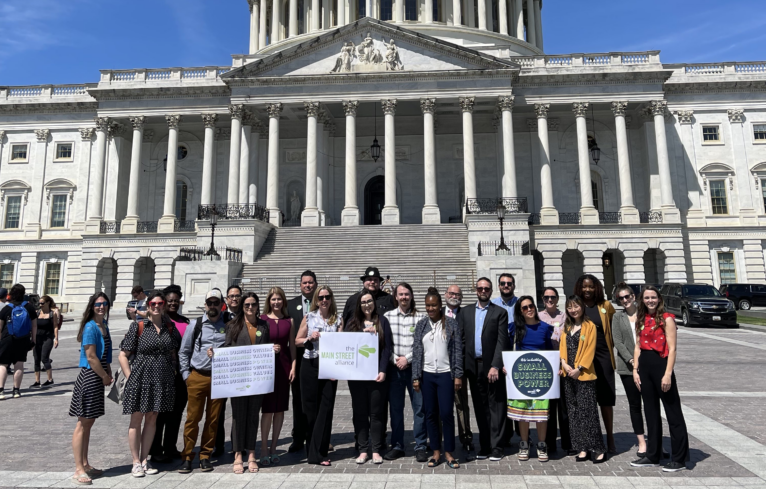Johnson Chided For Opposing Restaurant Aid
Senator’s opposition helps kill federal Restaurant Revitalization Fund.

Main Street small businesses met with Republican Sen. Ron Johnson’s office, Democratic Sen. Tammy Baldwin, Republican Reps. Tom Tiffany, Mike Gallagher and Bryan Steil, and Democratic Rep. Mark Pocan. They raised the need for urgent support to recover and long-term investments to level the playing field. Photo courtesy the Main Street Alliance/Wisconsin Examiner.
The ceremony to recognize Madison-area chef Dave Heide as Wisconsin’s 2022 Small Business Person of the Year on May 4 drew several prominent politicians, including U.S. Sen. Tammy Baldwin and U.S. Rep. Mark Pocan. U.S. Sen. Ron Johnson was absent, though a member of his staff spoke on Johnson’s behalf.
Johnson’s office also followed up by sending Heide a certificate recognizing his award. So it is galling to Heide that Johnson voted against providing additional funding for the Restaurant Revitalization Fund (RRF). The bill was approved 52-43 — falling eight votes short of a filibuster-proof 60, so it failed.
“The one thing that could have saved my business, he just vetoed,” he adds, “and a week after sending someone with his fancy little certificate saying how important I was.”
Heide was one of several members of Main Street Alliance, a small business advocacy organization, who flew to Washington, D.C., last week to meet with Wisconsin delegates to advocate for replenishing RRF. Other members of the group who went were Dan Jacobs, owner of DanDan and Fool’s Errand in Milwaukee, and Anna Ringstad, business development manager at Indianhead Community Action Agency in Ladysmith, along with various small business owners across the state.
Jacobs points out that two-thirds of restaurants that applied for the RRF program did not receive any funding, including 3,000 restaurants in Wisconsin. Many were hoping they would be eligible for funding in the next round.
Heide says he personally knows of 12 restaurant owners who were holding out hope for another round of RRF funding, but now that that’s gone, they’re in the process of closing permanently.
The impact is not confined to Madison and Milwaukee. Ringstad, who provides free business consultations and technical assistance for small business owners in northwestern Wisconsin, says that she has seen “first hand the way that we have businesses shutting down.”
“And in a region where we don’t have a lot of access to resources, every small business needs to be a priority,” Ringhand says. “We don’t have any highly populated areas and I’ve had requests pretty consistently for help with funding to keep the doors open.”
Ringstad doesn’t know anyone who received RRF funding, and quite a few business owners told her they didn’t want to apply for Paycheck Protection Program (PPP) funds because they were afraid they wouldn’t be forgiven and they’d be saddled with debt. One program that did make a difference in her neck of the woods, she says, was the Main Street Bounceback grant program, which Gov. Tony Evers created using federal COVID-19 relief funds.
Whether in rural communities, medium-sized cities or the big metro areas of Madison and Milwaukee, the closure of small businesses, including restaurants, will have ripple effects on the local economy, Jacobs points out.
When the team went to Johnson’s office, the senator did not meet with them. They know that he was in town, because Jacobs bumped into him at the airport; they were on the same flight to D.C.
“He started talking about the need for congressional oversight and the fact that people took PPP money and bought Lamborghinis,” Jacobs says. “I was like, if you haven’t noticed I’m wearing a t-shirt and Vans. I’m obviously not driving a Lamborghini.”
Last week, when asked during an interview which historical figure he would like to meet for dinner, Johnson said he’d have George Washington and Milton Freedman over to his house for grilled steaks because he’s “not that fond of restaurants.” Johnson’s critics later connected the remark to his vote against RFF funds.
Still, Heide says he understands why it strikes people as unfair that some businesses that received federal pandemic relief funds shut down anyway. There was no requirement for restaurants that received RFF funds to stay open, so some closed, laid off their workers, and used the funds to pay for the basics — including rent and utilities — so they could reopen later. Now, those same restaurants are able to offer much higher wages using the funds, giving them a competitive edge in a tight labor market.
The playing field would have been more level had the federal government been able to agree to replenish the funds, he adds. While several members of the small business group that traveled to Washington voiced their anger at Johnson, Heide also expressed frustration with a federal government that is unable to come together to help people in need due to a small number of Senators, including Johnson.
“The House [of Representatives] keeps sending these amazing bills that could help really fix some systemic problems and the Senate needs 60 votes in order to pass f—ing anything,” Heide says. “So we are in a complete lock on getting anything that could actually help people done just from seven people. It makes me sad. I’m not even mad anymore. I’m just heartbroken that this is my country.”
Wisconsin restaurateurs couldn’t persuade Ron Johnson to vote for revitalization funds was originally published by the Wisconsin Examiner.






















If it does not help billionaires, Ron Johnson will oppose it.